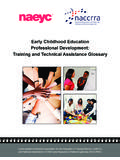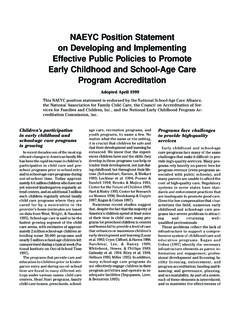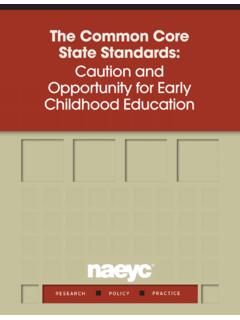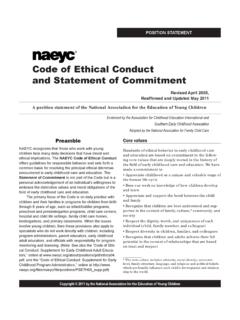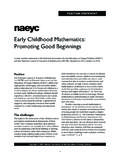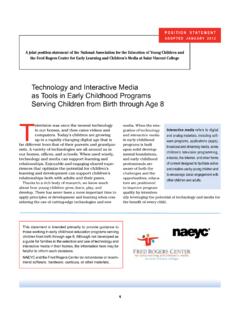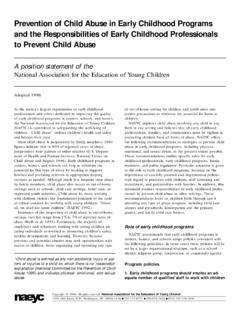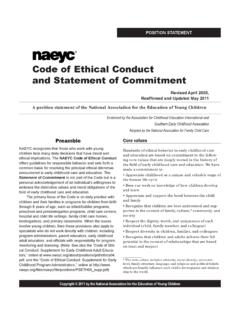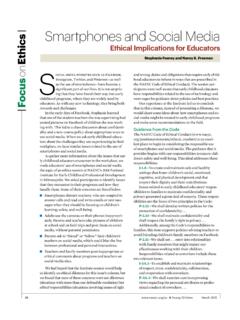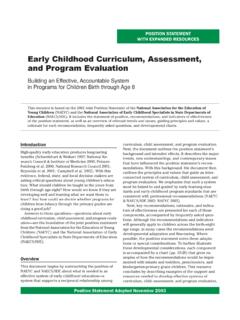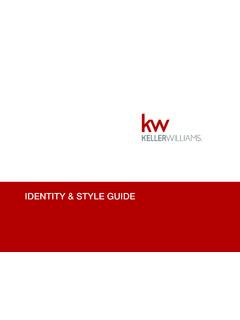Transcription of Code of Ethical Conduct
1 Code of Ethical Conduct Supplement for Early Childhood Program Administrators Adopted July 2006, Reaffirmed and Updated May 2011. A Position Statement Supplement of the National Association for the Education of Young Children Adopted by the National Association for Family Child Care Administrators of programs for young children are re- sibility to address the needs and safeguard the rights of sponsible for overseeing all program operations, serving families and personnel and respond to the requirements as leaders in their programs, and representing the field of their boards and sponsoring agencies. to the community. Early childhood program administra- tors are called upon to sustain relationships with a wide variety of clients. They interact with and have responsi- Purpose of the Supplement bilities to children, families, program personnel, govern- ing boards and sponsoring agencies, funders, regulatory Like those in the field who work directly with young chil- agencies, their community, and the profession.
2 Dren, program administrators are regularly called upon Program administrators deal with unique responsi- to make decisions of a moral and Ethical nature. The bilities and Ethical challenges in the course of managing NAEYC Code of Ethical Conduct (revised 2005, reaffirmed and guiding their programs and assume leadership roles and updated 2011) is a foundational document that maps within and beyond their programs. As managers and the Ethical dimensions of early childhood educators'. leaders, they are called upon to share their professional work in early care and education programs. Program ad- knowledge and expertise with families, personnel, gov- ministrators share the Ethical obligations assumed by all erning boards, and others; demonstrate empathy for the early childhood educators obligations that are reflected families and children they serve; and communicate re- in the core values, ideals, and principles set forth in the spect for the skills, knowledge, and expertise of teaching Code.
3 Administrators embrace the central commitment staff, other personnel, and families. Administrators ac- of the early care and education field and the Code to cept primary responsibility for executing the program's ensure the well-being and support the healthy develop- mission as well as developing and carrying out program ment of young children. policies and procedures that support that mission. They also make a commitment to continue their own profes- sional development and the continuing education of Note: This Supplement was reaffirmed by the NAEYC Governing the personnel in the program they lead. Administrators Board in May 2011 and changes were made to Ideals and Princi- also may be advocates for all children being able to gain ples that regard responsibilities to families to ensure alignment access to quality programming. Some of the challenges with current family engagement best practices in the field.
4 In faced by administrators involve balancing their obliga- addition, references to the Code of Ethical Conduct , Section III, tions to support and nurture children with their respon- Part C: Responsibilities to Employees were deleted, as Section III, Part C was deleted in the May 2011 update of the Code. Copyright 2011 by the National Association for the Education of Young Children. All rights reserved. Ethics Supplement for Administrators 2 Adopted May 2011. Given the nature of their responsibilities, however, administrators face some additional Ethical challenges. Definitions Conflicts often surface in the areas of enrollment poli- cies; dealings with personnel; and relationships with Administrator families, licensors, governing boards, sponsoring agen- The individual responsible for planning, implementing, cies, and others in the community.
5 The existing Code is and evaluating a child care, preschool, kindergarten, a valuable resource that addresses many of the Ethical or primary grade program. The administrator's title issues encountered by administrators. However, it does may vary, depending on the program type or sponsor- not provide all of the guidance that they need to address ship of the program. Common titles include director, the unique Ethical issues that arise in their work. This site manager, administrator, program manager, early Supplement offers additional core values, ideals, and childhood coordinator, and principal. (Note: The defi- principles related to the frequently recurring Ethical is- nition of administrator and other relevant text in this sues encountered by administrators. Supplement are consistent with the Leadership and Management standard of the NAEYC Early Childhood Program Standards and Accreditation Criteria.)
6 Core values Personnel In addition to the core values spelled out in the NAEYC. Code of Ethical Conduct , early childhood program Staff members employed, directed, or supervised administrators commit themselves to the following ad- by an administrator. Here, unless otherwise noted, ditional core values. personnel includes all program staff and volunteers providing services to children and/or families. (Note: We make a commitment to Because program administrators may be supervisors Recognize that we have many responsibilities to chil- and not employers, we have adopted the terms per- dren, families, personnel, governing boards, sponsoring sonnel and staff in lieu of employees for this Supple- agencies, funders, regulatory agencies, the community, ment to the Code.). and the profession and that the well-being of the chil- dren in our care is our primary responsibility, above our obligations to other constituencies.
7 Titioners in resolving Ethical dilemmas. Together, the Recognize the importance of and maintain a humane and ideals and principles are intended to direct practitioners fulfilling work environment for personnel and volunteers. to questions that, when responsibly answered, provide Be committed to the professional development of staff. the basis for conscientious decision making. While the Code and this Supplement provide specific direction for addressing some Ethical dilemmas, many others will Conceptual framework require early childhood program administrators to com- bine the guidance of the Code and/or this Supplement This document sets forth a conception of early child- with their best professional judgment. hood program administrators' professional responsi- The ideals and principles in the Code and this bilities in five areas, some of which differ from those Supplement present a shared framework of professional identified in the NAEYC Code.
8 Each section addresses responsibility that affirms our commitment to the core an area of professional relationships: (1) with children, values of our field. The Code and the Supplement public- (2) with families, (3) with personnel, (4) with sponsoring ly acknowledge the responsibilities that early childhood agencies and governing boards, and (5) with the commu- professionals assume and, in so doing, support Ethical nity and society. The items in each section address the behavior in our work. Practitioners who face situations unique Ethical responsibilities of administrators in early with Ethical dimensions are urged to seek guidance in care and education settings. the applicable parts of the Code/Supplement and in the spirit that informs the whole. Ideals and principles The ideals and principles in this Supplement are based on early childhood program administrators'.
9 This Supplement identifies additional ideals that reflect descriptions of Ethical dilemmas they have encountered exemplary practice (our aspirations) and principles in their work. They are designed to inspire and guide describing practices that are required, prohibited, or administrators toward actions that reflect the field's cur- permitted. The principles guide Conduct and assist prac- rent understanding of Ethical responsibility. Copyright 2011 by the National Association for the Education of Young Children. All rights reserved. Ethics Supplement for Administrators 3 Adopted May 2011. The Supplement also includes items from the We shall support children's well-being by en- NAEYC Code that directly relate to the work of admin- couraging the development of strong bonds between istrators some are duplicates of Code ideals or prin- children and their families and between children and ciples, and some are adaptations.
10 Items from the Code their teachers. that are repeated or adapted for this Supplement are We shall support children's well-being by promot- cross-referenced with their corresponding ideals and ing connections with their culture and collaborating principles, with the Code references indicated in paren- with communities to ensure cultural consistency be- theses. Other items that expand and extend the NAEYC tween the program and families' childrearing practices. Code were written specifically for this Supplement. We shall make every effort to provide the nec- (Note: There is not necessarily a corresponding principle essary resources (staff, consultation, other human for each ideal.) resources, equipment, and so on) to ensure that all children, including those with special needs, can ben- 1. Ethical responsibilities to children efit from the program.
